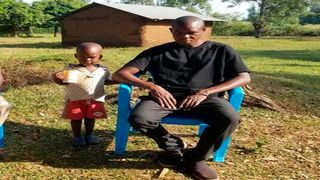
Fred Ochieng (right) who had been missing since April 30, 2021 and had been presumed dead. He resurfaced on June 12, 2021 as the family was preparing to bury the remains of a man thought to be his.
| Ian Byron | Nation Media GroupMigori
Premium
Boda boda rider presumed dead returns home alive amid burial plans
The family of a boda rider presumed dead after going missing for two months held prayers to cleanse their homestead when he returned home alive amid burial arrangements for him.
The family, strict adherents of the Seventh-day Adventists church, said they held a prayer session at the home to seek spiritual cleansing after the shocking incident.
Fred Ochieng, 39, returned home on Saturday after finishing his two-month jail term at Homa Bay GK prison. He had been convicted of breaching traffic regulations.
In an exclusive interview with the Nation on Monday, Erick Omondi, Mr Ochieng’s elder brother, said the family sought spiritual intervention after coming across human remains that they had concluded were those of their lost kin and started burial arrangements.
Skeleton in cane farm
Last week, cane cutters stumbled on a skeleton, and Mr Ochieng’s relatives concluded it was his remains, only for him to return home alive and well.
Mr Omondi said they had reported Mr Ochieng’s disappearance to the police and on local radio stations.
“He left for work on April 30 and never came back. We had been frantically searching for him, and even reported him missing,” Mr Omondi said when the remains were retrieved.
The family, unaware of their kin’s whereabouts, took the remains to the Rosewood Hospital mortuary and started planning for a burial.
“We paid a deposit for the coffin, bought a bull and several goats and started the burial preparations,” he told the Nation at his home in Kasere village.
“We were shocked to see him back the day we planned to remove the body from the mortuary. We have called for prayers to cleanse the home.”
On Sunday, members of three local SDA churches held prayers at Mr Ochieng’s rural home, where family and neighbours gathered.
After the day-long service, the family took the animals they had bought back to the market and forfeited the coffin bill. The firewood that had been dried for use during the planned funeral was also given out to villagers.
Luo customs
Under Luo customs, a banana stalk was often planted in place of the missing person in cases where the person could not be found, as explained by Kamagambo council of elders chairman Mzee Sam Ayieko.
If the missing person returned, elders would perform rituals on him or her before the person is allowed to return home.
“On the day of his return, he could not come directly to the home. A bull, or any animal would be slaughtered and the blood mixed with concoctions would be sprayed on the person as a way of cleansing,” noted Mr Ayieko.
Although the body found by cane cutters was yet to be identified, police urged the public to report any case of a missing person.
“We are yet to get post-mortem results after taking samples for DNA testing. I’m, however, appealing to residents to inform us of anyone who might have been missing to aid with investigations,” Rongo Sub-County Police Commander Peter Okiring told the Nation.
Relatives’ contacts
The frail-looking Ochieng recounted to the Nation how his failure to remember his relatives’ contacts landed him in jail.
The boda boda rider said he was arrested by traffic officers attached to the Rangwe Police Station, some 30km from Rongo, where he had picked up a passenger.
“Being a Friday, I was locked up in police cells, where I spent the entire weekend. I did not have any of my relatives’ contacts off my head, and neither did I have a cell phone,” Mr Ochieng recounted.





